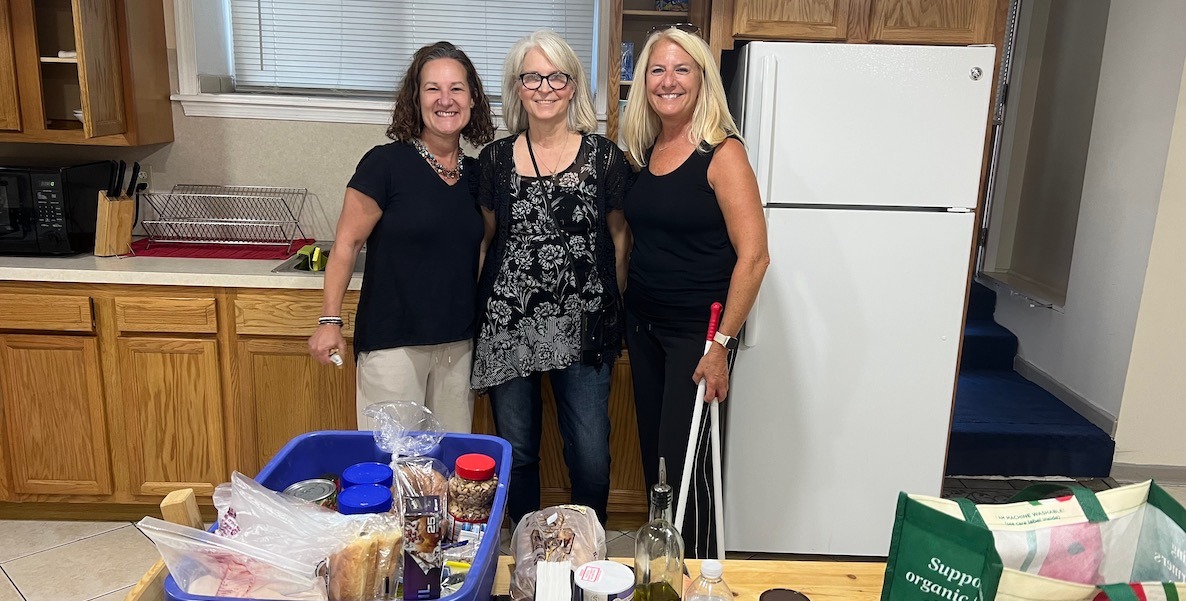Jill Goldstone has always been known as a “connector.” When her neighbor wanted to start a group chat so that their Rydal, Montgomery County community could stay in touch, Goldstone took the idea and ran with it: quickly maxing out the number of people who could be added to the chat. After her friend Andrea Giordano mentioned that her daughter was looking to get a job in finance, Goldstone immediately introduced her to a colleague working in the field, leading Giordano’s daughter to find employment.
And, in 2022, when someone wrote a rude anonymous note and left it on a neighbor’s property, Goldstone thought: “This is the antithesis of what our community is.” Afraid that the note might divide her neighbors against one another, she hosted a block party so that everyone could get to know one another better. “She knows so many people and has so many different connections that you’re almost like … What is your history? How do you know all these people? But she’s just so outgoing … and willing to help out,” says Giordano.
While the Rydal group chat originally began as a place to swap recommendations for contractors, the thread eventually became a place where, in January 2023, a community member asked an important question. She was wondering if anyone would like to join her as a sponsor for Welcome Corps, a new program under the U.S. Department of State in which Americans can engage directly in refugee resettlement. Though she didn’t yet know much about the organization, Goldstone leapt at the chance to get involved.
“I grew up with the mindset of my mother having been the daughter of an immigrant.” — Jill Goldstone
Goldstone’s grandmother was a Jewish refugee who emigrated to the United States from Poland when she was 16 years old because of the Holocaust. The rest of her family, who were not lucky enough to emigrate, were killed. “I grew up with the mindset of my mother having been the daughter of an immigrant,” Goldstone says. She knew she wanted to help other refugees, to honor her mother and grandmother.
“I think it’s great when people can help people outside of themselves,” says Goldstone. “That’s part of the problem we have in this country with political things. We don’t know each other.”
In addition to Goldstone, three more neighbors signed up for the cause. (The sender of the original text message asked not to be named, due to her job.) They still needed one more person to establish a private sponsorship group per Welcome Corps’ rules, so Goldstone reached out to Andrea Giordano. Giordano was hesitant, as she had never worked with refugee populations before. But, she trusted her friend Jill. “I was like, ‘Come on. It’ll be fine. It’s an adventure,’” Goldstone recalls. Though the five women didn’t know each other well, the work quickly bonded them. That month, the Rydal Refugee Resettlement Committee was born.
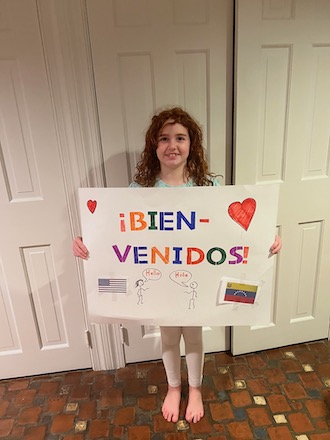
“This family will be in all our families.”
The current global displacement crisis affects approximately 110 million people, marking the highest recorded number of refugees in history. These individuals face significant challenges returning to their home countries due to persecution based upon race, religion, nationality, sexual orientation, or political beliefs. Under the Immigration and Nationality Act, refugees are able to pursue a life of safety and dignity in America. The chance to be resettled in the United States signifies the opportunity to begin anew, free from the threats of violence and persecution.
Starting over can be incredibly scary, though, especially when displaced people have neither friends nor family in their new country, and don’t know the language. Sponsor groups under Welcome Corps help to ease this transition, taking on tasks such as meeting refugees at the airport, finding and furnishing their initial housing, registering the children for school, and helping the adults find work.
In the Rydal Refugee Resettlement Committee (RRRC), each group member agreed to take on a different aspect of the resettlement, based on their own strengths and backgrounds. Goldstone was put in charge of healthcare and fundraising. Because she had worked in the insurance field, she already knew how to navigate the websites and forms associated with programs like Medicare and SNAP. And, as a known “connector,” it was a no-brainer that she would handle raising money.
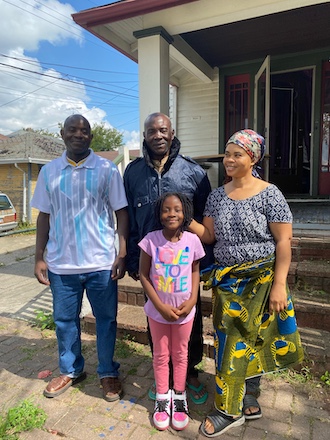
“I know a lot of people, so I’m always reaching out,” Goldstone says. “I’ve never done real fundraising before, but I found that I was pretty good at it and that I have a network of wonderful people who are just very generous.”
She promptly created a GoFundMe, began hosting fundraising parties at friends’ houses, and put together a charity concert at the Abington Art Center. Recently, the Abington Art Center even agreed to be the group’s 501(3)(c) partner, allowing the committee to seek bigger donations from corporations rather than relying on the generosity of individuals. To date, Goldstone has led the group in raising over $11,000, money which has helped the group settle four refugees so far.
The RRRC was matched with their first refugee in August 2023, and he arrived in America just one month later. Sal, an elderly Congolese farmer, had spent the last 20 years in a refugee camp in Tanzania. Since 1996, conflict in The Democratic Republic of the Congo has led to approximately 6 million deaths, creating the most complex and long-standing humanitarian emergency in Africa, and the fourth largest refugee crisis in the world.
“They are excellent, wonderful, kind people. We arrived alone, and now we feel that we have a family.” — Valentina Godoy
In the camp, Sal (who is going by a nickname in order to protect his fragile status as a refugee) lived for two decades without running water and electricity. By the time his resettlement to the United States was approved, he was 72 years old, and his wife and five of his seven children had died. Though the RRRC hoped to integrate Sal into Philadelphia’s Congolese community — they spent months developing a relationship with a local Congolese church — it turned out that Sal had a son living in Ohio, who begged for his father to live with him. The RRRC sent him some of the money they had raised for him, and then embarked on the process of welcoming a new family.
The Morales Godoys arrived in Philadelphia on January 11, 2024. The family of three — including 31-year-old John Morales, 25-year-old Valentina Godoy, and 7-year-old Alan Godoy Morales — came from Venezuela. After being continuously victimized by criminal groups, and often fearing for their lives, they were in search of safety. Welcome Corps does not permit private sponsorship groups to contact refugees before their arrival, so the RRRC was only given a basic sketch of the family: their names, ages, language, nationality, and when and where they’d arrive. It took the family four days of nonstop travel to reach Philadelphia, and they had no idea who would be meeting them at the airport, nor any understanding of English. “It’s very scary!” Goldstone notes.
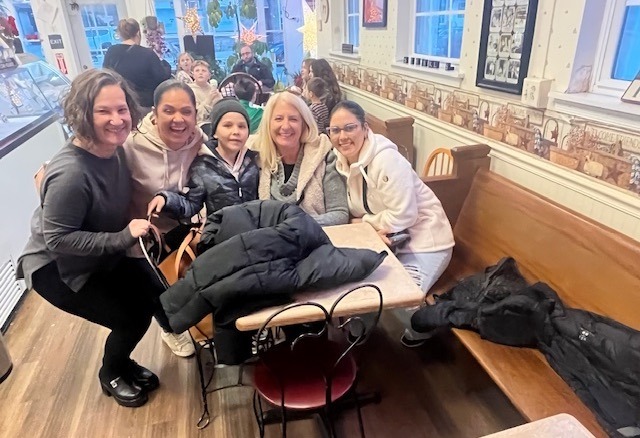
With a sign written in Spanish, and Google Translate on standby, a few members of the RRRC met the family at the airport. They managed to secure the family a one-month stay in an Airbnb in nearby Jenkintown, per a charitable program that Airbnb runs to support disaster victims. It was 11pm by the time the family arrived at their temporary housing, and Alan was hungry and wanted to eat something “American.” Specifically: a Hawaiian pizza, which Goldstone happily ordered for delivery. Then, Valentina called her mother and sister on WhatsApp, to let them know she had landed.
“Her mother and sister were crying on the other end [of the phone.] They were so happy that she was safe,” Goldstone recalls. “And she said to her mother, ‘Look, Mom. This is my new family.’”
Over the last month, at least one member of the RRRC has visited the Morales Godoy family each day. The group members take the family to the grocery store, doctor, bank, and language classes. They hosted a seventh birthday party for Alan, and were with him when he saw snow for the first time. On one of their first trips to grab groceries, Valentina found a job in the store’s bakery department. John was also offered a job, with Goldstone’s contractor friend — the same one that she initially recommended in the Rydal group chat. (“From the minute they got off the airplane [they were] like, ‘How quickly can we work?’” Goldstone jokes.) And, just this week, Alan enrolled in school.
“It is a month of learning and adaptation,” Godoy says, through a translator. “It is not easy to adapt because the language clearly [is new to] us, but it is all a matter of time, we know. All of the things we have experienced have been incredible. We are grateful for everything!”
Their resettlement has been nothing short of a group effort. Goldstone found someone to donate a computer to the family; her sister went by to set it up last weekend. Someone else is dropping off a printer. Now the group is looking for a car donation.
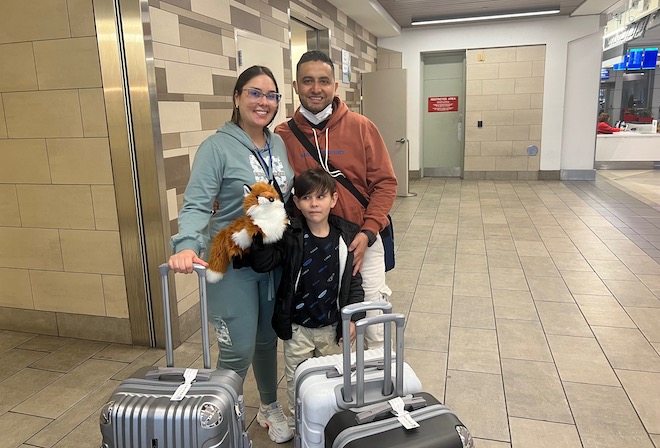
The RRRC will continue to support the Morales Godoys for their first three months in America. After that, the program calls for supporters to taper off their help and the family to transition to being on their own, with the RRRC falling into the role of supportive neighbors and friends. “This family will be in all of our families. We’re not just going to stop seeing them,” says Giordano.
“They are excellent, wonderful, kind people,” Godoy says. “We arrived alone, and now we feel that we have a family.”
The Rydal Refugee Resettlement Committee celebrated their one-year anniversary on January 20, 2024. Goldstone says they’ll decide at the end of their time with the Morales Godoy family if they want to go another round. To her, the answer is clear. With the RRRC, she feels like she’s been given “the greatest opportunity in the whole world:” the opportunity to give somebody a better, safer life. “It is one of the most fulfilling things I’ve ever done.”
![]() MORE GOOD CITIZENSHIP
MORE GOOD CITIZENSHIP



